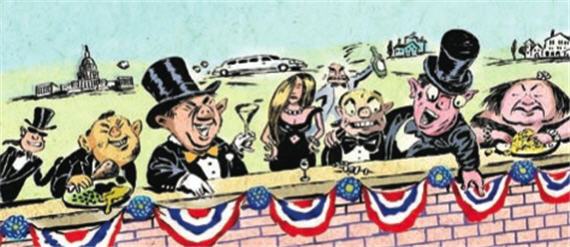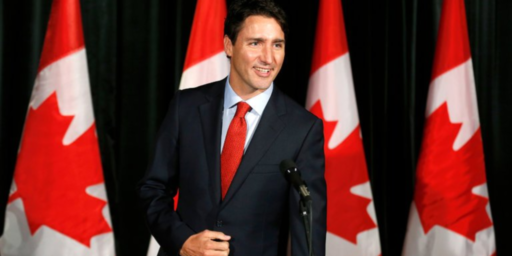Taxing Millionaires
A special tax rate for millionaires wouldn't raise much additional revenue but it would make journalists feel better.
James Surowiecki thinks it obvious that, “An annual income of two hundred and fifty thousand dollars puts you in the top three per cent of American households, and is more than four times the national median. You’re rich, and a small tax increase isn’t going to rock your world.” Because those people have a lot of influence and have people convinced otherwise, however, he figures we should just go after the “very, very rich.”
Between 2002 and 2007, for instance, the bottom ninety-nine per cent of incomes grew 1.3 per cent a year in real terms—while the incomes of the top one per cent grew ten per cent a year. That one per cent accounted for two-thirds of all income growth in those years. People in the ninety-fifth to the ninety-ninth percentiles of income have represented a fairly constant share of the national income for twenty-five years now. But in that period the top one per cent has seen its share of national income double; in 2007, it captured twenty-three per cent of the nation’s total income. Even within the top one per cent, income is getting more concentrated: the top 0.1 per cent of earners have seen their share of national income triple over the same period. All by themselves, they now earn as much as the bottom hundred and twenty million people. So at the same time that the rich have been pulling away from the middle class, the very rich have been pulling away from the pretty rich, and the very, very rich have been pulling away from the very rich.
The current debate over taxes takes none of this into account. At the moment, we have a system of tax brackets well suited to nineteenth-century New Zealand. Our system sets the top bracket at three hundred and seventy-five thousand dollars, with a tax rate of thirty-five per cent. (People in the second-highest bracket, starting at a hundred and seventy-two thousand dollars for individuals, pay thirty-three per cent.) This means that someone making two hundred thousand dollars a year and someone making two hundred million dollars a year pay at similar tax rates. LeBron James and LeBron James’s dentist: same difference.
This makes no sense—there’s a yawning chasm between the professional and the plutocratic classes, and the tax system should reflect that.
It’s not entirely clear to me why LeBron’s dentist owes a greater proportion of his salary to the state than LeBron. After all, a basketball player’s earnings window is much, much smaller. And dentist salaries are subsidized by the state, anyway, since many are paying with Medicare, Medicaid, and other government programs.
Still, while my theoretical ideal would be a tax system that charges an equal rate to everyone, preferably on purchases rather than income, that’s not politically feasible. Further, given that massive governmental spending is here to stay — because the American people effectively demand it — we’ve got to pay for it somehow. And, while I believe everyone should pay something, the well off are going to have to pay more. Disproportionately more. And we’ve had top marginal rates as high as 92% in the postwar era, so it’s hardly unprecedented.
Obviously, there are limits to how much you can tax the rich without killing the goose that lays the golden eggs. But the Laffer curve does in fact bend! Nate Silver runs some numbers and figures that a 3% hike on income over $1 million, “you’d bring in $26 billion per year, or $256 billion over ten years. If you taxed income above $1 million at 5 percent, you’d produce $43 billion per year, or $427 billion every ten years.” But that’s without factoring in any productivity losses from the diminished incentive. Doing that, he figures “revenues on the order of $35 billion per year, or $350 billion per decade, are more realistic.”
Or, in other words, about what the Defense Department spends on toilet paper.
So, unless we’re talking about very draconian raises — and, really, even then — we’re not talking about a solution that would close the gap between spending and revenue. And it’s only going to increase if we don’t figure out how to solve our demographics issues and control the cost of providing health care.
Megan McArdle has a theory as to why this keeps coming up:
[T]he definition of “very rich” seems increasingly to be set at “just above the level a top-notch journalist in a two-earner couple could be expected to pull down.”
While snarky, I think that’s about right. Most of us tend to define “rich” at some level well above our own. Unless you’re making millions every year, you tend to think of yourself as merely “middle class.”
If you’re a journalist in a two income couple that makes $300,000 and still has to give up vacations in order to pay school tuition, it hardly seems fair that LeBron James and you are in the same tax bracket–not while you’re living in less than 2000 square feet. But if you’re someone who has to give up vacations in order to pay the dentist and the electric bill, this probably seems eminently fair. Anywhere in the country, you can live very well on $375,000. Even in New York, if you look at living within the city limits as a luxury that costs a huge chunk of your salary, rather than as one of life’s basic necessities.
The second–and I think the most important–point to make is that while LeBron James’ marginal tax rate is the same as someone making $375,001 worth of AGI, his effective tax rate is much higher, since he pays the highest rate on much more of his income. The latter pays 35% on $1 of his income. James will pay it on most of his salary.
Right on both counts.
Look, there’s no doubt that there’s a decreasing marginal utility to each additional dollar earned beyond a point. As Garth Brooks observed some years back, he’d already earned more money than his grandchildren would be able to spend. And the Bill Gateses and Warren Buffets of the world are literally giving their money away, they have so much of it.
Regardless of how we structure our tax system, those at the upper end will pay more. That’s where the money is. And adding another graduation point into the tax code, especially one at historically moderate rates, is unlikely to send people looking for tax havens or taking premature retirement.
But it’s not going to go very far toward fixing our problems.







James, I’m heartened to find you have a soft spot for the Fair Tax. Now if only some of the Druids who post here would explore it.
gee, whatever happened to equal protection under the law …
besides there are alot of retired “millionaires” with, lets say 5 million in the bank, who make less than 5% on their millions who would “escape” this tax … shouldn’t we go after their principal in some way ?
I mean come on … they have plenty …
so are you saying that if taxing those above 250K at a rate of, lets say 60%, would “solve our problems” then it would be ok ?
Taxation questions aside, doesn’t this give anyone pause?
Sam,
It’s phenomenal but doesn’t necessary bother me. I’m guessing it’s basically WalMart, Microsoft and Apple founders accounting for most of it! It’s possible to get phenomenally rich in a way that wasn’t possible before.
And not sure it matters. What does matter is quality of life. And that’s been going up pretty powerfully throughout my lifetime.
Sam,
Regarding that period 2002-2007, some if not most of that growth rate is due to measuring the time period as a trough to peak over the business cycle. High income earners tend to have very cyclical earning periods with business income and stock market gains being key. In 2002, the .com bubble just burst, corporate profits where way down and the stock market just fell. High earner incomes were tmeporaraily low.
On the other end of the period, 2007, was the peak of the stock market and the peak of the housing bubble economy. im willing to bet that if you took a more accurate period over a cycle, say 1999-2007 (peak to peak) or 2002-2009 (trough to trough), it wouldnt be that high of a growth rate.
Also in comparison to the middle class, these income numbers are based on tax forms, so it doens include income that much of the middle class sotcks away in 401ks and IRAs which have seen more growth over the past decade – thereofre under reporting income growth to middle clase people.
Furthermore, these numbers are by household, so increasingly the demographic shifts of more single parent housholds mixed with more two professional income earners distorts the distribution. On the low end, we have more single worker housholds. On the high end, we have two high earning professionals. Years ago, you would have only one high earning professional in a household. So ints not really that income has grown as fast, but rather we now have twice as many people working to get that number.
And lastly, these numbers are all before taxes on the top end and before transfer payments and other government programs on the low end. If you look instead of income but rather consumption per houshold, inequality is not nearly as severe.
to also add, middle and lower income people take a larger percent of their compensation in the form of benifits. With healthcare costs rising, benifit compenation has been rising faster than cash income. As a worker you may just only notice your wage not growing too quickly, but you are continuously being paid more and more in the form of healthcare. Addressing skyrocking healthcare costs would help much faster growth in disposable income for most people. Unfortunetally our recent healthcare bill doesnt address healthcare costs at all and will leikly accelerate the problem.
and really the last point, even if there is this great divergence, so what? If steve jobs makes a ton of money because he created products that make large imporvments to the quality of life to hundreds of millions of people and those people were willing to pay for it, then he has been a major net posative to peoples lives.
Well, you have to factor in the A-hole effect, as in “screw you a-holes I’m moving to the Caymans.” True, eventually they’d return provided America still had something to offer after the sting subsided. Of course, many of the very wealthy are building their Doomsday compounds and so could retire to them.
It is basic plunder psychology – they have it, other want it and aren’t afraid to use the law to get it. As for the post-war tax rate of 92%, first we bomb the rest of the world to the fall of 1945, then we enact the tax increase.
Well, I was just struck by that figure. That’s a lotta money in a few (relatively speaking) places. But I’m Rawlsian enough to believe that that figure is justifiable for just those reasons you set out in your really, really 🙂 last point.
Dr. Joyner,
Neither you nor McArdle take into account some of the non-economic reasons for increasing taxes on the very wealthy – in particular, that extremes of wealth and poverty can have a destabilizing effect on the culture.
Not only is it now possible for a few to become wealthy in ways previously unimaginable, but the visibility of the fabulously rich is far greater than it ever has been before. At a time when unemployment is 10%, and underemployment considerably higher, this strikes me as an increasingly dangerous dynamic. And we don’t have a culture, like Japan’s, where extremely high salaries are taboo.
I think conservatives who shrug at this are seriously underestimating the extent to which wealth disparities, especially generational wealth disparities, contribute to a dispirited and alienated culture.
Also: the notion that founders of Apple-Microsoft-Walmart make up the bulk of the huge wealth gains seen in the last decade is so 1995. It is bankers, not entrepreneurs, who have seen their wealth increase drastically since 2000.
I don’t make a million dollars a year at present, but I have in years past, and still do well. I can pay another 5%. It won’t make me produce less, it will make me produce more. When I produce more I create jobs.
I should pay more because I can. And because when forced to pay more I produce job growth. (More people than you think are in this position.) And because as a person with some means I profit disproportionately from a system that does so much to protect my life and lifestyle.
A little consistency would be helpful here. Interesting how for many conservatives $35 billion a year is nothing. Less than the DoD spends on toilet paper. And yet $26 billion aid to states and localities is a budget-breaking handout to the teacher’s union.
First, I haven’t made these arguments, so I’m at least consistent. Indeed, while I haven’t spent any real time looking at the issue and don’t have a strong opinion, I’m quite persuadable that subsidizing high priority state spending is a legitimate use of federal monies in a global economic crisis.
Second, I do think tax increases and spending increases are different things that should be judged by different metrics. Spending money without paying for it does indeed add to the deficit. But it doesn’t follow that the way to pay for it is to simply raise the taxes of an unpopular minority group.
Third, I think spending — and borrowing to pay for it — not tax cuts, is the primary cause of our fiscal woes. So, we do have to learn to say No to discretionary spending. And that includes long-term entitlements and, goodness knows, the Defense budget.
Fourth, I’m not theoretically averse to small tax hikes that would impact high earners. That, even though, using Obama’s definition, I’m one of them. The top bracket is near historic lows. But I do think the “tax the super, super rich” notion is built on animus rather than economic theory.
Michael, why don’t you and Bernard and Anjin san and others of your generous persuasion offer to pay much more in taxes to help out those of us who are less fortunate? Why wait to be forced to pay? All the rich limousine libs, and Hollywood windbags, and other overpaid prima donnas could really help our economy by returning your ill gotten gains to the treasury. Then persuade the overpaid bureaucrats in this country to take a pay cut to help our economy. Michael, nice job bragging about your exalted place in life. You are a true American hero.
Reynolds, you make that kind of money. I am for taking all of yours you lefty.
<I>And we’ve had top marginal rates as high as 92% in the postwar era, so it’s hardly unprecedented.</I>
Please note though that as marginal rates increased so did a plethora of deductions with a net result of income tax raised as a % of GDP remaining fairly constant.
If you want to raise the marginal rate up to 92% but you give me the opportunity to deduct scores of expenses that I presently can’t deduct, then on net, I’m no worse off (discounting the accounting costs, the costs associated with structuring my financial affairs in order to take advantage of tax shelters, and the deadweight loss associated with the whole scheme.)
Pete,
<i>Michael, why don’t you and Bernard and Anjin san and others of your generous persuasion offer to pay much more in taxes to help out those of us who are less fortunate?</i>
You don’t understand. The whole point of their making such declarations is to signal to others how compassionate, enlightened, community-minded, and generous they are. They have no intention of actually following through on voluntarily sending an additional 5% – 15% of their income to the government as a gift. The actual expense of doing that would outweigh the benefit to their psyches. It’s much cheaper, free in fact, to pontificate in public about how willing they are to make the sacrifice and they reap the benefit to their reputation without having to make any actual sacrifice.
I know you can probably work this out all by yourself, but a handful of individual donations aren’t going to do much to help the government out.
Your comment was very much in the line of people who say, “If you want a war, why don’t you fight it?”
In other words, beside the point and silly without being either witty or original.
Pete and ZR3:
I love this by the way:
And:
I love right-wing class jealousy. And I have to admit I do love rubbing your little faces in it. Having heard so very, very much about how liberals hate work and hate capitalism and love sitting around sucking at the government teat, there’s a certain satisfaction in absorbing the resentment of a furious little Tea Partier like Zels who in fact is sucking at the federal teat.
You might think you’d pause a moment and re-examine your assumptions about liberals and conservatives and life in general, but of course: no. You’ll continue to simultaneously hate liberals who succeed while accusing us all of being socialist losers.
In some that would be cognitive dissonance, but I think in this case it’s just dumb. So just to irritate you a little more, I’ll add that I grew up lower class, lived in trailers on a bayou, dropped out of high school and didn’t even bother to start a career till I was in my mid-30’s. Oh, and happily married to one woman for 33 years.
Pop! The sound of Zels’ head exploding.
It won’t make me produce less, it will make me produce more.
Amen. We are within shouting distance of 250k a year, and the fear of a tax hit is not deterring me from busting my ass for a promotion in the least. But hey, I am just another far left Marxist, right? BTW, I did not finish high school and I started my career at 37. Perhaps I am just a better at capitalism than all the wanna be Captain Americas out here who have outsourced their thinking to Fox News.
>They have no intention of actually following through on voluntarily sending an additional 5% – 15% of their income to the government as a gift.
No, I don’t. I have 2 seriously ill relatives and an aging parent that I help support. But you won’t hear me whining about my taxes like an old woman. I leave that to you.
Anjin:
Dude! We really need to start a late-bloomer’s club.
Michael, there you go again, in your sanctimonious tone. Calling people names while justifying your positions because of your fortunate rise from poverty. I do not disparage your success; just your attitude that “because I rose from the ashes, I know better for the rest of the poor saps out there. I will pay more taxes because I am successful. And because I am willing to pay more and because I can afford it, I am in favor of government coercion for everybody.” You seem to be blinded by hubris.
I am not envious as I am also successful and financially comfortable, but I do not appreciate people who think they know better what is good for me and others.
I think it’s funny that Republicans are very comfortable talking about cutting (or holding down) taxes while …
… there’s that federal debt, just sitting there.
Either name your budget cuts (by the trillions) or say who you are going to tax.
(BTW, if Michael had is million dollar year pre-Bush, he probably already did pay ‘higher’ taxes. Not that I paid much attention to that sub-topic after it got crazy)
Let me guess, the ‘plan’ is still to fight taxes while ‘wishing’ for lower spending.
Two more thoughts:
1) “Taxing Mere Millionaires” would be a pithier title.
2) Remember Dillinger on “why do you rob banks?”
So I can only assume you oppose all taxes of any type. Since you object to “government coercion.” Which would make you an anarchist. Which is certainly a position. Not one generally held by people who own more than two t-shirts, but it’s a philosophy of sorts.
Of course if it turns out you’re not an anarchist, that you don’t object to at least a measure of “government coercion” then I’m not quite sure where the outrage is. If you believe X% is appropriate and I believe Y% is more appropriate then we’re both in favor of “government coercion,” just disagreeing over percentages.
> I am in favor of government coercion for everybody.”
No doubt you are boycotting the roads that were paid for via government coercion. And you have probably long since denounced the US Armed Forces, also funded via coercion.
“Michael, why don’t you and Bernard and Anjin san and others of your generous persuasion offer to pay much more in taxes to help out those of us who are less fortunate?”
Actually, I am doing just that. I benefitted quite nicely from the Bush tax cuts, thank you very much. But I am patriotic enough to realize that my personal benefit needs to be weighed in context against our national needs. I’ll still be able to afford my second home, boat, travel, and put my kids through college even if the marginal rate goes back to what it was in the Clinton years.